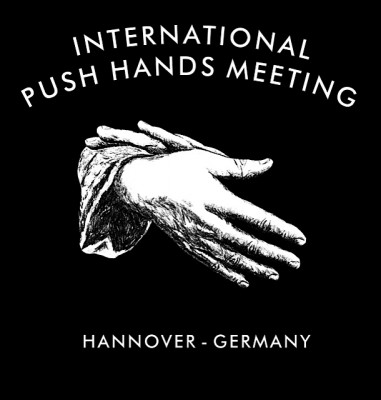Teachers and Themes of the 24th Push Hands Meeting
| Room 1 | Room 2 | Room 3 | |
| Wednesday, 07.05.2025 | Birgit Golze | Sven Gusowski | Giles Rosbander Martin Neumann |
| Thursday, 08.05.2025 | Birgit Golze | Sven Gusowski | Giles Rosbander Martin Neumann |
| Friday, 09.05.2025 | Birgit Golze | Mirke de Kruijf | Giles Rosbander Martin Neumann |
| Saturday, 10.05.2025 | Nils Klug | Mirke de Kruijf | Gudula Motsch |
| Sunday, 11.05.2025 | Nils Klug | Mirke de Kruijf | Gudula Motsch |
Birgit Golze
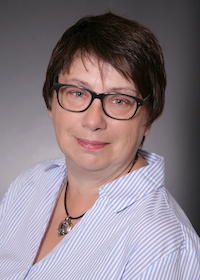
Birgit Golze has been practicing Taijiquan for over 20 years. For 13 years, she has been teaching Taijiquan and partner exercises in her native city Dassel. Birgit discovered her passion for Push Hands during her teacher training with Master Nils Klug. Since this time, her own teaching of the form is closely linked to partner work.
Birgit’s passion for Push Hands has led her to meet national and international teachers both in Germany and internationally as well as on meetings all over Europe. Birgit also gathered valuable experience in competitions, always ranking among the first three places.
And last not least, Birgit has been a long standing member of the organizing team of the International Push Hands Meeting Hannover. It is save to say that over the years she has ”seen it all” – and she is happy to share her experience with you.
Nils Klug
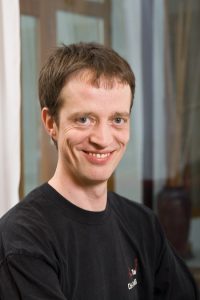
Nils Klug has been teaching Tai Chi Chuan in Hanover, Germany since 1991.
In 1993, he opened his first school. As the rooms soon proved to be too small, Nils decided to remain loyal to his Linden neighbourhood. He thus built his new school into one of the halls of the disused former factory building as part of an ecological project aimed at preserving the now listed building.
Since 1996, the Tai Chi Studio is now located at the Ecological Business Park Linden in close connection to the socio-cultural centre of FAUST e.V.
Teacher training and impulses
Nils Klug completed his teacher training with William C. C. Chen in New York. He has been teaching in his own school for over 30 years. William Chi Cheng Chen and Dr. Tao Ping Siang (Taiwan, +2006), who as Nils’ second teacher has also had a profound influence upon his Tai Chi, both have been students of Prof. Cheng Man Ching.
Nils’ further impulses are received by means of exchange with colleagues in the Chinese arts and of course his students.
Voluntary engagement for the Chinese arts
Until May 2014, Nils has been an active member of the German Network for Taijiquan and Qi Gong (“Netzwerk Taijiquan and Qi Gong e.V.”). Between 2007 and 2013, Nils served in the Taijiquan and Qigong Federation for Europe (TCFE), the European umbrella organisation for Tai Chi and Qigong, as its president. Between 2014 and 2018, Nils has been the second chairman of the DDQT (German Association of Professionals in Qigong and Taijiquan).
In his activities, Nils is committed to promoting international exchange, continual professional training and communication, crossing the boundaries of styles and schools. In this spirit, he organised the 4th Federal Qigong and Taijiquan Forum for the German Network in 1998 and the International Cheng Man Ching Forum 2004 in Hanover.
Since 2001, he and his team organize the International Push Hands Meeting in Hanover, a bilingual (English/German) indoor meeting, which takes place annually in spaces around the Tai Chi Studio in Hannover-Linden.
Over the years, Nils has been teaching at numerous Tai Chi meetings in Germany and internationally and has been hosting at great number of guest teachers from around the globe.
In addition to other online activities, Nils has also been creating an international online portal for Tai Chi and Qigong, now accessible in two languages, on which he has been continuously working during his free time.
Continuous beginners’ program
*Our bilingual workshop for Push Hands beginners follows a coordinated schedule with matching topics. It is led by Birgit Golze (Wednesday-Friday) and Nils Klug (Saturday/Sunday).
Wednesday – Friday (Birgit Golze)
At the beginning, a promise: During partner work, you will never be alone! For this communication between two people to succeed, making contact with the Other is the first step. If we are feeling secure and comfortable, we will loosen up enough to be able to notice the movements of our partner more precisely – we will be able to listen to what is sent towards us. To gather our first experiences in the increasingly spontaneous play with question and answer is the goal of the workshop’s first three days.
Wednesday – Making contact
In this workshop, we want to lay the base for our communication: we practice to listen, to feel and to go along with the flow.
With only a few, but intensive exercises, we will make our first contact with push hands and focus on taking notice of our partner in free partner exercises.
Due to this soft beginning, this workshop is also suitable for anyone that does not want to start the meeting by immediately going “all in” on the first day.
Thursday – Feeling movements
The second day will focus on the moving communication between two partners: What does my partner say to me? – and: What do I tell him*her? How is the flow of the information going back and forth between the two persons? We will experiment with some ideas that we may use in free push hands in the afternoon.
Friday – Playing
The third day centers around Pushing Hands as a game between two partners. Working with exercises that provide us with the necessary safety, we will be practicing how to be a good partner as well as developing a sense for the actions of our partner.
We will learn new vocabulary by widening our horizon with additional experiences: Learning how to deal with slow and fast, small and big movements of our partner will help us to communicate more spontaneously with our counterpart.
Saturday / Sunday (Nils Klug)
Flexibility and creativity on both sides are needed to develop a conversation in progress into a really good story. The fourth day of the workshop will therefore focus on calmness and collectedness – because inner tranquility is the basis for a flexible posture towards unusual ideas that will be thrown at us. – And on day 5, we will learn how to go one step further even in such a situation. After all, the conversation is supposed to be an interesting experience for both sides.
Saturday – Flexible (re)actions
The wordless communication in free Pushing Hands is open and spontaneous. Even though one may get to know one’s partner over time, one often does not foresee what will be next. Thus, it is a good idea not to commit oneself too early to a specific response.
Today, we will work on the basics of a flexibility that allows us to wait in a relaxed manner until we see things develop themselves without giving up our basic posture in the course of the conversation: Today, we will say “YES!” to everything crossing our way!
Sunday – Spinning the yarn of our story
Nobody has an answer to everything! – Or do we? To expand a sentence into a story, the idea has to be continued. Improvisational theatre therefore does not know the answer “No” concerning ideas to develop the story, but instead works with “yes, BUT”, or even better: “yes, AND”.
Yesterday’s take away was how to say “yes” without giving up our space. – How to add our own ideas is the topic of the last day of the beginners’ workshop. And of course, Nils will give you some simple tips on what to do when you run out of ideas in the middle of the conversation…
Mirke de Kruijf
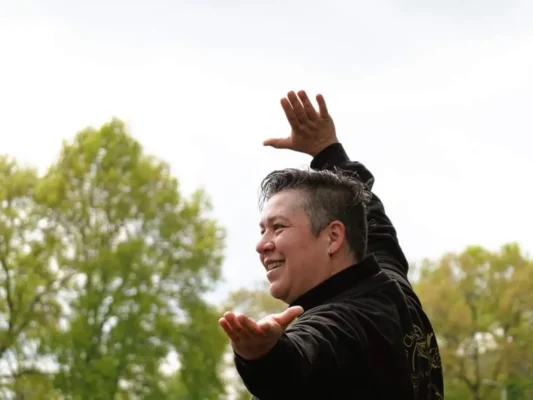
My Tai Chi life
10 years ago I started Tai Chi with Master Judith van Drooge (Inner Touch Tai Chi) She taught me the Yang style from Grandmaster W. C. C. Chen. Beside the handform she taught me several weaponforms and Pushing hands. I was introduced in competition and even went to the World Championship in Taiwan.
In daily life I got interested in the teaching side of Tai Chi. Under Judith’s wing I had the opportunity to delve into the world of teaching Tai Chi. In 2018 I started teaching and successfully completed a State Recognised Course: ‘teacher martial arts in the discipline Tai Chi’.
Since september 2023 I have my own school and give 17 classes a week.
Topic: Balance play for 2
We will play with balance, look for the yin and yang within ourselves and in the others.
We investigate the “art” in the Martial Art Tai Chi where technics and intention meet. We will use some excercises from partnerforms and free movement. We explore and get new experiences wich can be used in your Tai Chi and Pushing Hands.
Sven Gusowski
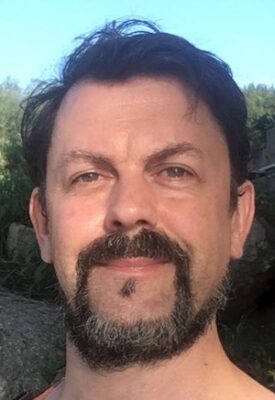
- 2003-2005 Wu-Stil with Veit Voigt (after Master Ma Jiangbao), Berlin
- 2005-2009 Chen-Stil with Jürgen Herkt (after Master Chen Xiaowang), Berlin
- 2010-2016 Chen Stil Practical Method with Michael Winkler (after Master Chen Zhonghua), Berlin
- Regular attendance of Workshops und Camps with Master Chen Zhonghua in Berlin, Prag, Valdagno, Toulouse, Wien & Gdynia
- Since 2016: Directing and organising of the Chen Stil Practical Method Taijiquan
- Regular Journeys to Daqinshan/China & and to Hong Kong for trainings
- Since 2017 Tudi / Disciple (internal student) of Master Chen Zhonghua
Theme
Workshop-Inhalt ist die Einführung in das Trainingssystem der ‘Practical Method’ mittels Basic Foundations (Einzelübungen), kooperativen Partner-Übungen sowie anhand von Anwendungsbeispielen, inkl theoretischen Erläuterungen.
Gudula Motsch
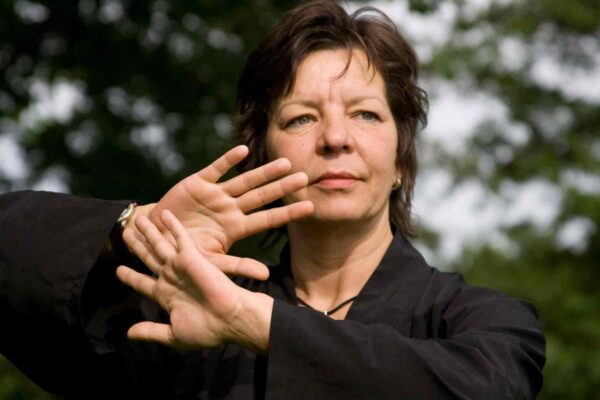
Taiji came into my life in 1993 and I began to learn the short and long forms according to Cheng Man Ching from Ulla Fels. My interest in Push Hands began in 2002 and since then I have regularly attended the relevant international Push Hands meetings. Over the years I have received countless inspiration from participating in many great workshops.
In 2009 I turned to the Wudang style and shortly afterwards became a student of Sifu Tian Liyang from the Wudang Mountains in China. In his school in Wudangshan (China) I learned Michuan Taiji (64 form) and have since regularly attended his seminars in Germany. In addition to many Qigong forms, I also learned Xingyi Bagua – a mixture of Bagua and Xingyi – from Sifu Tian Liyang.
I began teaching in 2003, first in Hamburg, then in my own school in Freiburg and currently in Friedberg (Hesse). I have been teaching the Wudang style since I was authorized by Tian Liyang in 2014.
Topics of the workshop
Mindfulness (Yi) in Push Hands: it can be very wide and soft like the sky and then again sharp, strong and direct like a ray of light; it can be directed inwards or outwards or be alert and active both inside and outside. If I am aware of this mental power and continue to explore it, it will not only enrich my Taiji and my Push Hands.
For example, if someone asks us in Taiji to let go and become soft, we usually bring our attention to the corresponding part of the body and can then relax there. If we are in action like in Push Hands, we easily lose this inner alertness and can then quickly become a plaything for our counterpart.
This is exactly where we want to start in the workshop with questions like: Can I consciously align my awareness (Yi) in such a way that it is awake both internally and externally without effort, so that I am very aware of my inner structure and yet still awake and relaxed when playing with the other person? In which way does my Yi support me in this game in concrete terms? And how can the Yi help me to be flexible and elastic and yet still stable? The questions can of course vary slightly in the workshop.
Giles Rosbander / Martin Neumann
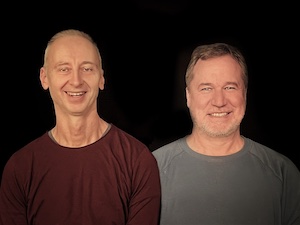
Giles Rosbander (formerly Giles Busk) had a background in dance theatre (Amsterdam) when he started studying Tai Chi Chuan (Cheng Man Ching style) with Wilhelm Mertens in Hamburg in 1996. He then trained with Nigel Sutton and several Malaysian-Chinese teachers, including Lau Kim Hong, in Malaysia (CMC style), also with Ömer Humbaraci in Hamburg (Shayuquan style) and then nine years with Fernando Chédel (Ma Tsun Kuen style). He received and continues to receive further inspiration through encounters with many other practitioners; he highlights several seminars with Dr Tao Ping Siang as a particular source of inspiration. He also gained experience in other Tai Chi styles and other martial arts and sports, e.g. MMA, Aikido, Bagua Zhang, Wing Chun and Systema.
He runs the ‘Cloud Hand Tai Chi Berlin’ school and gives seminars in Germany and internationally.
Martin Neumann started martial arts with judo and intensive karate training (Shotokan), then began practising Qi Gong and Tai Chi Chuan in the Peking and Yang styles at the age of 16. His most important teacher in Yang style was later He Lin Lin from Qingdao / PR China. It was under his guidance that he first understood the concept of lively and combative Tai Chi Chuan. Martin has been studying with Fernando Chédel since 2005. After initial difficulties – many things differed from what he thought he knew or was even able to do – he has immersed himself deeper in the Ma Tsun Kuen style over the years. Further inspiration came and comes from the Huang School, from Bret Hall (Cheng Man Ching style) and through lively exchange with other teachers, including Epi van de Pol.
He runs the DAO Centre Berlin and teaches at seminars in Germany and internationally.
Martin and Giles have been close friends for years; each has their individual, but related, teaching style. Their dialogue-based teaching creates a three-dimensional learning environment, which they convey in their ongoing seminar series “Tuishou Stereo”.
Finding freedom and connection
Freedom and connection are both fundamental human needs. In Tui Shou, freedom means being able to move and act without being strongly restricted. Moreover, we can be connected – within ourselves, to the other person and to what’s around us. These two qualities can also be understood as the interplay of yin and yang: they complement and generate each other – so we can be both free and connected.
In this workshop we will explore these two qualities and their interplay in partner exercises. We start with some exercises for grounding and ‘permeability’, with clear roles and varying intensities. We will then gradually move into free Tui Shou. The central question is: How can I find both freedom and connection within myself? And how does this help me to develop my Tui Shou skills further?
The answers to these questions are as varied as the experiences that result from this work…
Letting go under pressure
Tui Shou is basically simple – until it becomes difficult. Ideally, we remain free and light in our body and in our movements, while remaining grounded, connected and focussed. In practice, however, we tend to resist under pressure and become ‘hard’, or we give up and retreat.
In this workshop we’ll see how we can remain relaxed and ‘permeable’ yet also stable and clear – even when under (increasing) pressure. This process begins in the mind and in the centre of the body and moves out into the arms and hands. In various partner exercises we let go, or ‘release’, as a path to maintaining the connection: this lets us neutralise, defend and respond in an immediate, expanding and focused way.
We’ll learn how this inner letting go can produce both Yang quality (pengjin) and Yin quality (lujin) and how these energies flow into free Tui Shou. In the final phase of the workshop we will support you in applying these principles in free practice.
This workshop builds on the previous workshop ‘Finding Freedom and Connection’ but it’s open and suitable for everyone.
Tai Chi is round. So is Tui Shou!
We all know that tai chi chuan is ‘round’. But in real-life Tui Shou practice we often experience a linear back-and-forth – with a lot of rough edges and friction.
If we can manage to create three-dimensional roundness and can ‘surf’ on this, then Tui Shou becomes more fluid, more relaxed and at the same time more efficient in terms of practical martial art.
Using the partner exercises in the workshop, we explore how this roundness can be created and kept alive. We experience how we go with the flow, ride the waves, and at the same time maintain a clear focus. This gives us the ability to adapt and to transform.

